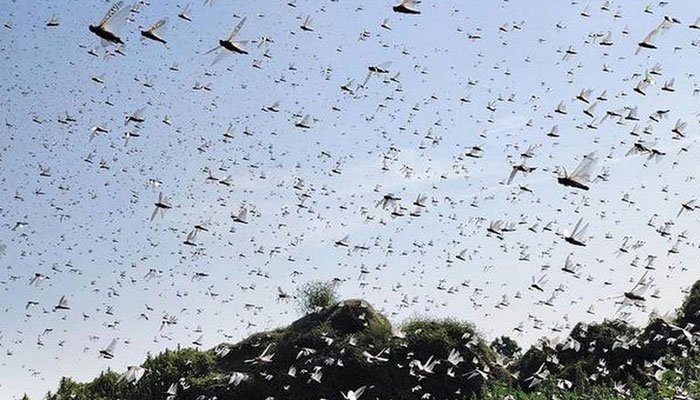Around 38% of Pakistan's agricultural land has turned into locust-breeding ground: FAO
Federal government was planning a project worth Rs 500 million to catch the locusts alive to use it as the poultry feed
June 09, 2020

FAISALABAD: Pakistan Agriculture Research Council Chairman Dr Muhammad Azeem Khan has said that all-out effort is being carried out to address the issue of locusts and other agricultural challenges.
Dr Khan visited the University of Agriculture Faisalabad and called on UAF Vice Chancellor Dr Muhammad Ashraf along with UAF agricultural engineers and entomologists.
Dr Muhammad Azeem Khan said according to the FAO, as many as 38 per cent of the total agricultural area in the country had become the breeding ground for the desert locusts.
He said that 97 per cent of our farming community was comprising small farmers that were unable to adopt the mechanisation which was hampering the process to boost up our agriculture.
The chairman said that the PARC would support the UAF to disseminate its locust spray machine, research and development work for fighting the agricultural challenges confronted the country. He also witnessed the UAF newly developed locusts spray machine first one in the country and termed it a hallmark step to combat locusts. The PARC chairman also visited the work on bio pesticide at locust research lab.
He said that federal government was planning a project worth Rs 500 million to catch the locusts alive to use it as the poultry feed.
The UAF scientists should provide a complete research and development on locusts nutritive values for poultry and its feasibility etc, he added.
UAF Vice Chancellor Dr Muhammad Ashraf said locusts had emerged as the second largest threat to the country after COVID-19 and it may be termed as 'COVID-20' as it was posing a serious threat to the food security.
He said that patents in the field of agriculture across the country were not more than 35 for which the agricultural scientists should come up with the innovative ideas to register these as patents.
He said that the UAF-developed locusts spray machine was first of its kind in the country that was bearing effective results. Dr Khan said that tangible research and development on locusts were underway at the UAF.
Originally published in The News











